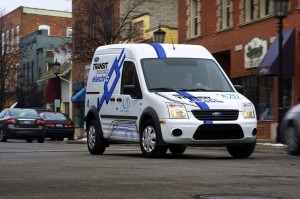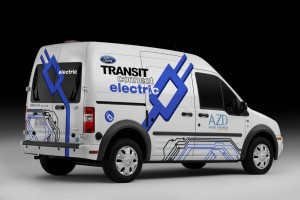
The Transit Connect Electric will have a targeted range of up to 80 miles per full charge, and will be rechargeable using either 240-volt or standard 120-volt outlets.
It’ll take a keen eye to see what’s different when Ford unveils the latest version of its Transit Connect van at this week’s Chicago Auto Show.
The automaker has gone out of its way to show off the flexibility of the quirky vehicle, which was named North American Truck of the Year, last month, from mobile pet grooming vehicle to catering truck. But with this particular version the clue is the small charge that replaces the Transit Connect’s conventional gasoline cap.
That’s because the Transit Connect electric will become the first new battery-electric vehicle, or BEV, in the Detroit maker’s line-up. It’s a decidedly different approach than most of Ford’s competitors. While most major automakers are plugging into what industry insiders have dubbed “electrification,” most are focusing on small city runabouts, like the Nissan Leaf.
But, “We see growing demand for these vehicles in commercial fleets,” says Scott Harrison, CEO of Azure Dynamics, the suburban Detroit firm that has partnered with Ford to develop the battery-powered version of the Transit Connect.

Ford says the battery pack for the 2011 Transit Connect electric will not reduce available cargo space in the van.
It makes sense, the partners are betting, because there are large numbers of commercial vehicle operators who clock relatively low mileage, each day, whle driving on set routes that would fall within the 80-mile range of the 2011 Transit Connect electric’s lithium-ion battery pack.
Today, using gasoline or diesel, commercial trucks and vans clock 12% of the miles motor vehicles log in America’s urban communities – but produce 25% of the emissions. Switching to battery power would significantly reduce that, Ford and Azure Dynamics contend, while also saving fleet operators significant money. On average, using off-peak charging, industry experts suggest that the cost of electricity for use in battery vehicles should run as little as one-tenth as much, per mile, as gasoline.
Using batteries provided by Johnson Controls Saft, a U.S./European joint venture, the 2011 Transit Connect electric is rated at a top speed of 75 mph and acceleration is said to be at least as good as with the van’s current, 2.0-liter inline-four-cylinder gasoline powertrain.
The battery pack is expected to last the life of the vehicle, or more than 100,000 miles. With current battery technology still significantly more costly than a conventional powertrain, there is expected to be a price penalty for the Transit Connect electric compared to the base of abut $22,000. Ford has yet to reveal the final price tag for the 2011 model, but it hopes to sell the technology by promoting its lower operating costs.
The 2011 Ford Transit Connect electric will reach showrooms late this year.
It is, in fact, one of several BEVs the automaker is working on. It has also confirmed plans to launch a battery-powered version of the new Ford Focus, about a year after the Transit Connect electric’s debut. And additional models are reportedly under development, along with some plug-in hybrids that will offer a motorist the ability to charge up overnight and handle routine commuting on battery power – then switch to a backup gasoline motor for longer drives.

Ford believes a CNG-powered Transit Connect could pick up taxi fleet business when the maker abandons the aging Crown Victoria line.
By some estimates, such technologies could account for 10% or more of the global automotive market by 2020.
Ford also is planning to bring a CNG or propane-powered version of the Transit Connect to market, the maker suggests. It is currently in negotiations with a number of taxi fleets who could find that for longer commercial applications these alternative fuels would provide advantages over gasoline — without the limited range of battery power. No set date for launch has been released, however the company has a reason to push considering it will soon be wrapping up production of the long-lived Crown Victoria that had served as the nation’s most popular taxi platform for decades.
